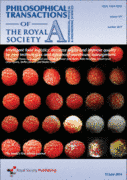Theme issue on intelligent food logistics
Transactions of the Royal Society A (Mathematical, Physical and Engineering Science) edited by the team of the intelligent containers and external experts. Volume 372, issue 2017, May/June 2014.
Guest Editors: Reiner Jedermann, Mike Nicometo, Ismail Uysal, Linus Opara, Steffen Janssen and Walter Lang
The need to feed an ever-increasing world population makes it obligatory to reduce the millions of tons of avoidable perishable waste along the food supply chain. Shelf life as the remaining time span, after which the quality drops below an acceptance threshold, is often reduced by deviations from the optimal cold chain conditions, where the added shelf life loss from deviations is physically invisible until much later in the supply chain. This issue summarizes a variety of approaches to detect and quantify these deviations, making shelf life variation known, by remote monitoring. Sensor systems measure temperature, humidity and concentrations of characteristic gases and the effect of deviating values is evaluated by biological models. Based on early detection of shelf life losses, it is possible to apply new strategies for supply chain and warehouse management, e.g. intelligent stock rotations and routing according to first-expired-first-out (FEFO) principles. In three case studies we show that improvements are possible in almost any perishable food chain by better pre-cooling, adequate postharvest treatments and permanent monitoring of cold chain conditions and product quality.
![]() Flyer and ordering information
Flyer and ordering information
![]() Transactions of the Royal Society A
Transactions of the Royal Society A







